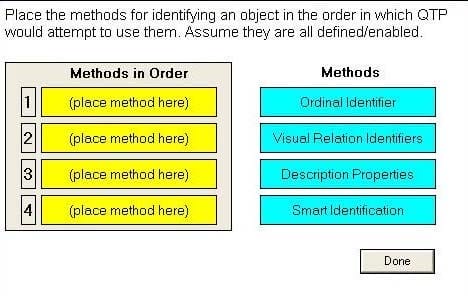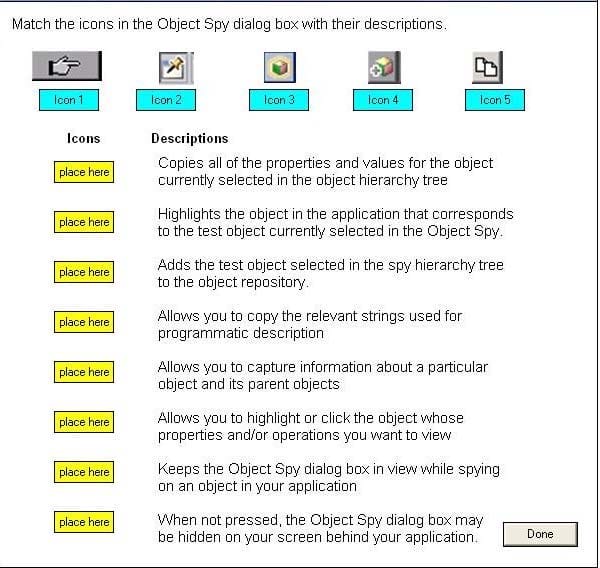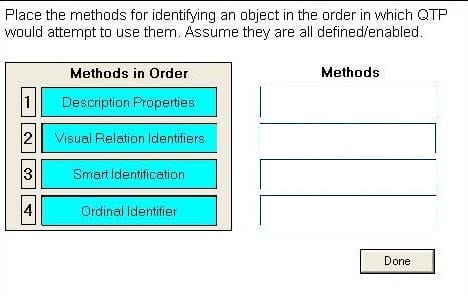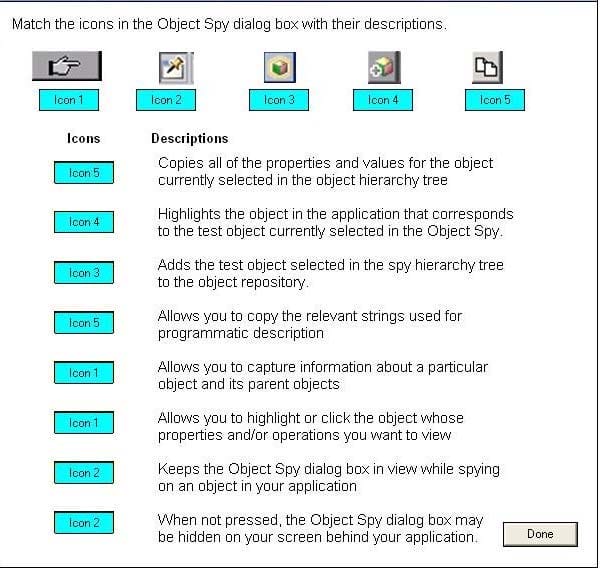HP0-M47 Online Practice Questions and Answers
DRAG DROP
Click the Task button. Place the methods for identifying an object in the order in which QTP would attempt to use them Assume they are all defined/enabled.

Select and Place:

DRAG DROP
Click the Task button. Match the icons in the Object Spy dialog box with their descriptions. Note: Icons may be used more than once.

Select and Place:

Which Web testing capabilities have been added in HP QuickTest Professional 11? (Select three.)
A. Firefox Document Object Model access
B. Internet Explorer Developer Toolbar support
C. Event Identifiers that enable identification based on events associated to a Web object
D. Javascript code capability that enables Javascript code to be embedded in all loaded browser pages
E. Property Identifiers that enable identification based on properties associated to a Web object
F. Vbscript code capability that enables Vbscript code to run in specific browser pages
What is created when you select Edit > Action > Split Action?
A. an independent action
B. a new shared object repository
C. an action fork
D. a new test
An HP QuickTest Professional instructor needs to take a sample test that was built in HP Application Lifecycle Management to an off-site training facility.
What is the simplest way to convert that test into a portable format?
A. Use the Export to Portable feature to export the test with its object repository into XML format.
B. Use the Save Test with Resources feature for main test and do the same for the test that contains the called reusable actions.
C. Use the Save Test with Resources feature.
D. Use the Export to Zip feature.
Which public toolkits are supported by the Web Add-in Extensibility feature? (Select four.)
A. ASP.NET AJAX
B. FOX
C. SUN JWDK
D. Motif
E. Google Web Toolkit
F. YahooUI
G. Dojo
H. COM.NET AJAX
You have created a Bitmap checkpoint and want to allow a certain degree of difference between a stored expected image and an image from the AUT and still consider it a PASS.
Which checkpoint feature should you use?
A. RGB tolerance
B. BW tolerance
C. image tolerance
D. bit tolerance
What is the purpose of the GetROProperty method?
A. to retrieve a property value of a runtime object
B. to retrieve a property of a test object
C. to retrieve a property value of a test object
D. to retrieve a property of a repository object
What is a logical name in HP QuickTest Professional?
A. the name assigned to a recorded object
B. the attached text of the test object
C. the name of a logical test condition
D. the name of the Object Repository
What is available in the Executive Summary section of the Run Result pane? (Select two.)
A. a graphical representation of the results
B. the Pass/Fail test status
C. the test parameters value
D. a still image of the state of the application at a particular step
E. the total run execution time
Which pane in the Run Result window should you use to compare test results across different test runs?
A. Captured Data pane
B. Compare Results pane
C. Statistics pane
D. Executive Summary pane
Which feature requires a connection to HP Application Lifecycle Management?
A. Jump to Step
B. Baselining
C. System Monitor
D. Save Test with Resources
Which type of visual cue is easy to test with HP QuickTest Professional and requires a large amount of time to verify manually?
A. content of an image
B. existence of an image
C. grayed-out field
D. text attachment
What are expected values in HP QuickTest Professional?
A. the values recorded during a test run and compared with original values within test objects
B. the values contained in the "expected results" property of each test object
C. the values predefined as the expected results of an unsuccessful test run
D. the values captured during recording and used in checkpoints as reference values
What are characteristics of HP QuickTest Professional's Process Guidance Tool? (Select three.)
A. It can be customized to define a customer's specific test automation processes.
B. It displays information about test process coverage.
C. It displays processes independent of the required document type and Add-in.
D. It can be used to navigate through the core activities of important testing processes.
E. It can be used to learn the preferred methodology for performing processes.
F. It can be used to generate tests from requirements.


